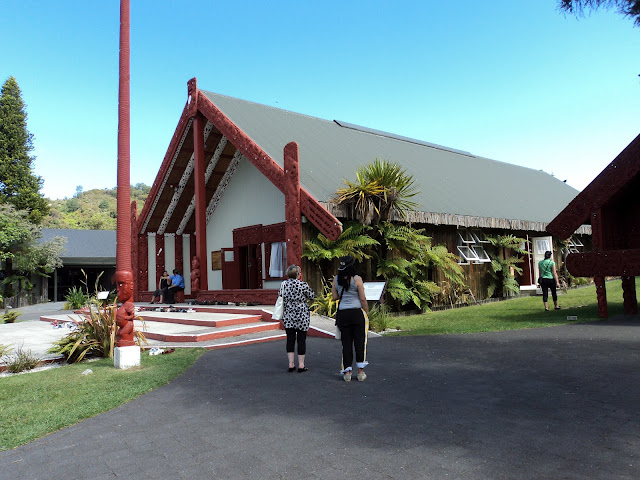Haeremai ki te marae
Welcome to the marae
Amo
Carved upright posts at front of marae.
Pā
Fortified village.
Paepae Beam
Beam across the front of the marae.
Seat where formal speechmakers sit during a ceremony.
Pare
Carved slab over door.
Pataka
Food storage house raised upon posts.
Poumua
Front Post.
Poupou
Carved post. Upright slab forming framework of walls.
Poutahu
Post supporting end of ridge-pole of a house.
Pou-Tokomanawa
Central pillar. The post in the middle of the wharenui.
Pou-Tuarongo
Post at the far end of the whare.
Raparapa
End part of the maihi representing the fingers of the whare tūpuna.
Tukutuku
Ornamental lattice work between upright slabs of the walls of a marae.
Urupā
Burial site, sacred graveyard.
Wharehoroi
Ablution block, shared bathroom.
Wharekai Dining Hall
Wharenui Meeting House
More pictures (Hamilton Gardens)
Welcome to the marae
Amo
Carved upright posts at front of marae.
Fortified village.
Paepae Beam
Beam across the front of the marae.
Seat where formal speechmakers sit during a ceremony.
Pare
Carved slab over door.
Pataka
Food storage house raised upon posts.
Poumua
Front Post.
Poupou
Carved post. Upright slab forming framework of walls.
Poutahu
Post supporting end of ridge-pole of a house.
Pou-Tokomanawa
Central pillar. The post in the middle of the wharenui.
Pou-Tuarongo
Post at the far end of the whare.
Raparapa
End part of the maihi representing the fingers of the whare tūpuna.
Ornamental lattice work between upright slabs of the walls of a marae.
Burial site, sacred graveyard.
Wharehoroi
Ablution block, shared bathroom.
Wharekai Dining Hall
Eating house. The wharekai is a separate building, not necessarily as a physical reality, but in some cases as a concept or belief. The expense and the physical location would affect that decision.
Central large communal Meeting House. Bears the name of the ancestor and is built in a style that reminds of a human body. The elaborately carved tekoteko at the gable of the wharenui is its head. The tekoteko looks into the future and watches for any possible enemy. The Meeting House traditionally faces the east in order to welcome every morning the first rays of sun light. The first sun warms the hearts and bodies of the people.
More pictures (Hamilton Gardens)
















